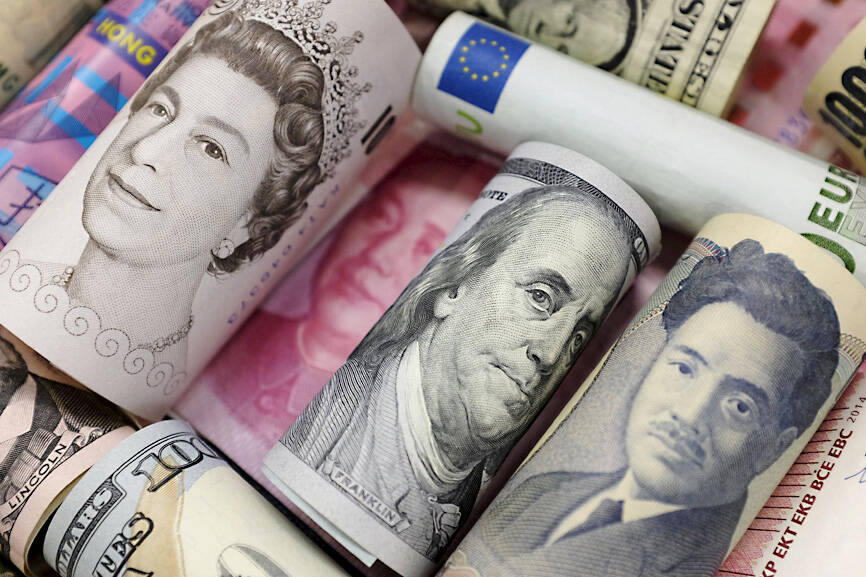Exchanging foreign currency with others privately is a contravention of the Banking Act (銀行法), which could result in fines, a lawyer warned yesterday.
The act stipulates that only banks that are authorized by the government are permitted to conduct monetary transactions, including those involving foreign currencies, lawyer Ko Lin-hung (柯林宏) said.
Article 29 of the act states that “unless otherwise provided by law, any person other than a bank shall not accept deposits, manage trust funds or public property under mandate, or handle domestic or foreign remittances.”

Photo: Reuters
Those who contravene the act face a prison term of three to 10 years, and a fine of NT$10 million to NT$200 million (US$325,362 to US$6.5 million).
“Although it is considered a relatively minor crime — compared with other financial crimes like money laundering — it is a crime nonetheless, and carries potentially hefty penalties,” he said.
In some cases, if evidence shows that the suspect only infrequently exchanges currency, and only exchanges small amounts, they might be given a suspended sentence, but such an outcome is up to the judge, he said, adding that the penalties far outweigh the small potential savings of privately exchanging currency.
Keelung Police Department Deputy Police Chief Shen Jui-kun (沈瑞坤) said that those who privately exchange large amounts of currency and do so often would be specifically targeted by police under suspicion of organized crime.
“Generally speaking, if someone openly solicits foreign currency exchange services on the Internet, the police will be informed and will open an investigation,” he said.
A bank manager, who asked to be identified only by their surname, Hsieh (謝), said that privately exchanging currency also introduces the risk of being given counterfeit notes.
“The general public has little contact with foreign currencies and is not aware of the anti-counterfeit features of those currencies,” Hsieh said.
“If someone is really that concerned about transaction fees, they can speak with a bank clerk or manager who they frequently deal with to inquire about a preferential exchange rate.”
Banks often discount rates for frequent clients or those exchanging large amounts, Hsieh said.

Eight restaurants in Taiwan yesterday secured a one-star rating from the Michelin Guide Taiwan for the first time, while three one-star restaurants from last year’s edition were promoted to two stars. Forty-three restaurants were awarded one star this year, including 34 in Taipei, five in Taichung and four in Kaohsiung. Hosu (好嶼), Chuan Ya (川雅), Sushi Kajin (鮨嘉仁), aMaze (心宴), La Vie by Thomas Buhner, Yuan Yi (元一) and Frassi in Taipei and Front House (方蒔) in Kaohsiung received a one-star rating for the first time. Hosu is known for innovative Taiwanese dishes, while Chuan Ya serves Sichuan cuisine and aMaze specializes

Taitung County is to launch charter flights to Malaysia at the end of this year, after setting up flights to Vietnam and Thailand, the Taitung County Government said yesterday. The new charter flight services, provided by low-cost carrier Batik Air Malaysia, would be part of five-day tour packages for visits to Taitung County or Malaysia. The Batik Air charter flight, with about 200 seats, would take Malaysian tourists to Taitung on Dec. 30 and then at 12:35pm return to Kuala Lumpur with Taiwanese tourists. Another charter flight would bring the Taiwanese home on Jan. 3 next year, arriving at 5:30pm, before taking the

Taiwan High Speed Rail Corp. (THSRC) plans to ease strained capacity during peak hours by introducing new fare rules restricting passengers traveling without reserved seats in 2026, company Chairman Shih Che (史哲) said Wednesday. THSRC needs to tackle its capacity issue because there have been several occasions where passengers holding tickets with reserved seats did not make it onto their train in stations packed with individuals traveling without a reserved seat, Shih told reporters in a joint interview in Taipei. Non-reserved seats allow travelers maximum flexibility, but it has led to issues relating to quality of service and safety concerns, especially during

STATS: Taiwan’s average life expectancy of 80.77 years was lower than that of Japan, Singapore and South Korea, but higher than in China, Malaysia and Indonesia Taiwan’s average life expectancy last year increased to 80.77 years, but was still not back to its pre-COVID-19 pandemic peak of 81.32 years in 2020, the Ministry of the Interior said yesterday. The average life expectancy last year increased the 0.54 years from 2023, the ministry said in a statement. For men and women, the average life expectancy last year was 77.42 years and 84.30 years respectively, up 0.48 years and 0.56 years from the previous year. Taiwan’s average life expectancy peaked at 81.32 years in 2020, as the nation was relatively unaffected by the pandemic that year. The metric